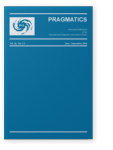How implicatures make Grice an unordinary ordinary language philosopher
Since Paul Grice first propounded his ideas surrounding conversation and implicature in 1967, they have had a continuous and tremendous impact on theorizing, and indeed on the design of entire research programmes, in philosophy, but also in many other disciplines, in particular linguistic pragmatics. Much of what builds on Grice’s original suggestions now belongs to the most powerful hypotheses in the respective fields. But while scholars outside philosophy usually acknowledge Grice’s merits for their own areas of interest, they hardly ever pay attention to his original philosophical intentions. These intentions are the central topic of the present paper. Its primary concern is to show how the theory of conversational implicature enabled Grice to adopt a unique theoretical position within 20th century analytic philosophy. In doing so, it also hopes to eliminate a number of widespread misconceptions regarding the explanatory ambitions of Grice’s original theory.
References (45)
Austin, John L
(
1946)
Other minds. In Austin 1979, pp. 76-116.
Austin, John L
(
1955)
The William James Lectures. Lectures delivered at Harvard University, Massachusetts. Publ. as Austin 1975a.

Austin, John L
(
1956)
A plea for excuses. In Austin 1979, pp. 175-204.
Austin, John L
(
1975a)
How to do Things with Words. Ed. by
J.O. Urmson and
M. Sbisà. Oxford: Oxford University Press.


Austin, John L
(
1979)
Philosophical Papers. Ed. by
J.O. Urmson and
G.J. Warnock. Oxford: Oxford University Press.


Borsche, Tilman
(ed.) (
1996)
Klassiker der Sprachphilosophie: Von Platon bis Noam Chomsky. München: C.H. Beck.

Brown, Penelope, and Stephen C. Levinson
(
1987)
Politeness. Some Universals in Language Usage. Cambridge: Cambridge University Press.


Carnap, Rudolf
(
1931)
Überwindung der Metaphysik durch logische Analyse der Sprache.
Erkenntnis II1: 219-241.


Carnap, Rudolf
(
1932)
Psychologie in physikalischer Sprache.
Erkenntnis III1: 107-142.


Carnap, Rudolf
(
1934)
Logische Syntax der Sprache. Wien: Julius Springer.


Cole, Peter, and Jerry L. Morgan
(eds.) (
1975)
Syntax and Semantics. Vol. 3: Speech Acts. New York: Academic Press.

Frege, Gottlob
(
1879)
Begriffsschrift. Halle a. S.: Nebert.

Frege. Gottlob
[1884] (1995) Die Grundlagen der Arithmetik. Stuttgart: Reclam.

Frege, Gottlob
[1893] (1966) Grundgesetze der Arithmetik. Hildesheim: Olms, 2 Bde.

Frege, Gottlob
(
1993)
Logische Untersuchungen. Göttingen: Vandenhoeck.

Frege, Gottlob
(
1994)
Funktion, Begriff, Bedeutung. Göttingen: Vandenhoeck.

Grice, H. Paul
(
1946)
Common sense and skepticism. In
Grice 1989, ch. 8.

Grice, H. Paul
(
1953)
G.E. Moore and philosopher's paradoxes. In
Grice 1989, ch. 9.

Grice, H. Paul
(
1957)
Meaning. In
Grice 1989, ch. 14.


Grice, H. Paul
(
1958)
Postwar Oxford philosophy. In
Grice 1989, ch. 10.

Grice, H. Paul
(
1961)
The causal theory of perception. In
Grice 1989, ch. 15.


Grice, H. Paul
(
1967)
The William James Lectures. Lectures given at Harvard University, Massachusetts. Publ. as chs. 1-7 in Grice 1989.

Grice, H. Paul
(
1975)
Logic and conversation. In
Cole &
Morgan (eds.), 41-58.
Grice, H. Paul
(
1981)
Presupposition and conversational implicature. In
Peter Cole (ed.),
Radical Pragmatics. New York: Academic Press, pp. 183-198.

Grice, H. Paul
(
1986)
Reply to Richards. In
Richard Grandy and
Richard Warner (eds.),
Philosophical Grounds of Rationality. Oxford: Clarendon Press, pp. 45-106.

Grice, H. Paul
(
1989)
Studies in the Way of Words. Cambridge, Mass: Harvard University Press.

Hacker, Peter M.S
(
1996)
Wittgenstein's Place in Twentieth Century Analytic Philosophy. Oxford: Blackwell.

Hanfling, Oswald
(
2000)
Philosophy and Ordinary Language: The Bent and Genius of our Tongue. London: Routledge.

Künne, Wolfgang
(
1996)
Gottlob Frege. In
Borsche (ed.), pp. 325-345.
Malcolm, Norman
(
1942)
Moore and ordinary language. In
Rorty (ed.) 1967, pp. 111-124.
Passmore, John
(
1957)
A Hundred Years of Philosophy. Harmondsworth: Penguin.

Rorty, Richard
(ed.) (
1967)
The Linguistic Turn: Essays in Philosophical Method. Chicago: The University of Chicago Press.

Ryle, Gilbert
(
1932)
Systematically misleading expressions. In
Gilbert Ryle,
Collected Papers. London: Hutchinson, vol. II1, 39-61.

Ryle, Gilbert
(
1949)
The Concept of Mind. London: Hutchinson.

Saul, Jennifer M
(
2002)
What is said and psychological reality: Grice's project and relevance theorists criticisms.
Linguistics and Philosophy 251: 347-372.
 BoP
BoP
Soames, Scott
(
2003)
Philosophical Analysis in the Twentieth Century. 2 Vols. Princeton: Princeton University Press.


Sperber, Dan, and Deirdre Wilson
(
1986)
Relevance. Oxford: Blackwell.
BoP
Stemmer, Peter
(
1996)
Sprachanalytische Philosophie (20. Jahrhundert). In
Borsche (ed.), pp. 401-419.
Strawson, Peter F
(
1952)
Introduction to Logical Theory. London: Methuen.
BoP
Strawson, Peter F
(
1990)
Review of Grice, P.: Studies in the Way of Words.
Synthese 841: 153-161.


Strawson, Peter F
(
1992)
Analysis and Metaphysics. Oxford: Oxford University Press.


Urmson, James O
(
1956a)
Philosophical Analysis: Its Development between the Two World Wars. Oxford: Clarendon Press.

Urmson, James O
(
1956b)
Some questions concerning validity. In
Antony Flew (ed.),
Essays in Conceptual Analysis. Westport: Greenwood, pp. 120-133.

Wittgenstein, Ludwig
[1921/22] (1984) Tractatus Logico-Philosophicus. Werkausgabe Bd. I. Frankfurt: Suhrkamp.

Wittgenstein, Ludwig
[1953] (1984) Philosophische Untersuchungen. Werkausgabe Bd. I. Frankfurt: Suhrkamp.
BoP
Cited by (1)
Cited by 1 other publications
Pfister, Jonas
2010.
Is there a need for a maxim of politeness?.
Journal of Pragmatics 42:5
► pp. 1266 ff.

This list is based on CrossRef data as of 15 july 2024. Please note that it may not be complete. Sources presented here have been supplied by the respective publishers.
Any errors therein should be reported to them.
